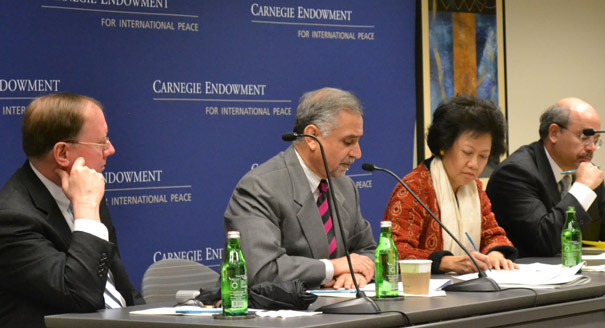Registration
Thank you!
You will receive an email confirming your registration.
IMGXYZ4069IMGZYXWhile Malaysia’s economic performance has been robust, its politics are in ferment. Under the constitution, general elections must be held in the next six months, and election fever is building. How are Malaysia’s parties aligned and what do they stand for? What are the important domestic and foreign policy questions facing the country? How is the economy expected to perform? Will Malaysia be able to avoid the “middle income trap”? Ambassador James Keith, Pek Koon Heng, and Alex Mourmouras joined Carnegie’s Vikram Nehru to discuss these issues and consider Malaysia’s prospects for the future.
Discussion Highlights
- Foreign Policy: According to Keith, Malaysia’s political transition is complete in terms of foreign policy. Since the meeting in 2010 between U.S. President Obama and Prime Minister Najib, Malaysia’s foreign policy has moved into another phase, with deeper international engagement on both economic and security issues. In terms of regional cooperation, Malaysia’s government has also shown its commitment by supporting the Global Movement of Moderation, the Trans-Pacific Partnership, and other bilateral and multilateral trade deals. In terms of balancing Chinese and U.S. influence, Malaysia, along with other Southeast Asian countries, has been striving to find ways to work productively with both countries in order to avoid any potential conflict in the region.
- Socio-Politics: According to Heng, Malaysian politics are deeply polarized. The country faces a demographic shift that is increasingly undermining the Barisan Nasional's (BN) ruling coalition. She argued that BN will win the upcoming election, but will lose a large number of seats and the popular vote as it did in the 2008 elections. The opposition coalition, Pakatan Rakyat (PR), is seeing a growing base of support among young people, both non-Malays and Malays, as well as among urbanites, she explained. Furthermore, disappointment over Najib’s reform agenda, the rising cost of living, effective civil society representation of non-Malays, as well as the opposition's focus on clean government and use of social media, are likely to further strengthen its base and weaken the ruling coalition's support, she concluded.
- Economy: According to Mourmouras, Malaysia is a strong economic performer that has rebounded well since the global recession, enjoying a 4.5 to 5 percent growth rate. Weaker exports to European and U.S. markets higher public and private investment as well as consumption, and lower unemployment have helped rebalance the sources of growth from external to domestic sources. This trend is expected to continue, transforming the country’s economic orientation from tradable to non-tradable goods and services. The Malaysian government has also increased investment in education in order to move its economy up the value chain toward a knowledge-based economy, and achieve high-income status by 2020. Mourmouras pointed out that Malaysia still faces a number of challenges, including fiscal consolidation and deficit reduction in the medium term, as well as declining demand from Europe, China, and the United States.
